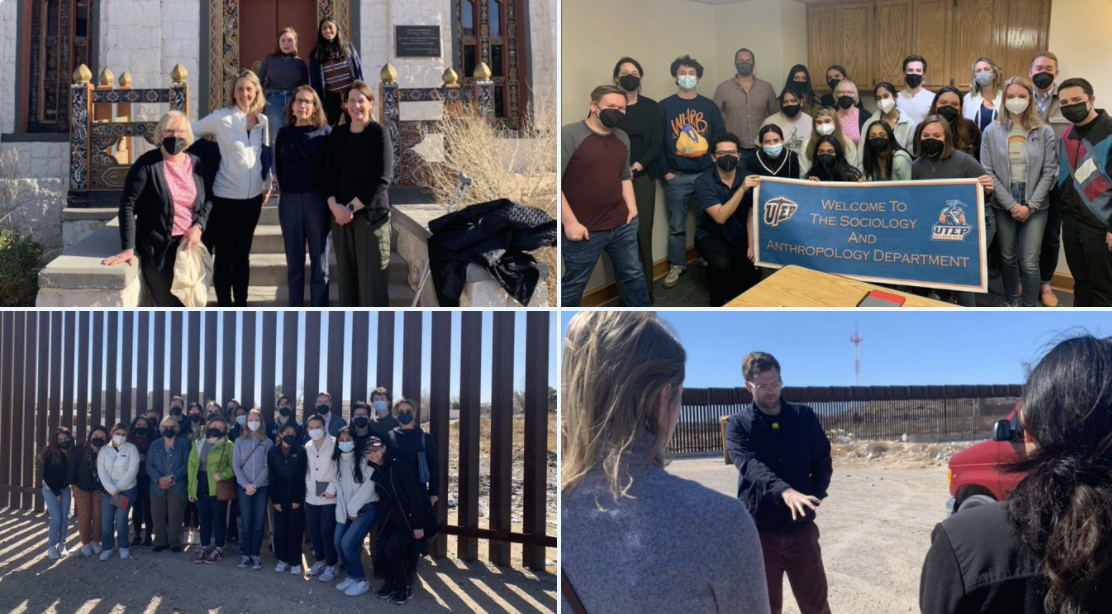
Georgetown University students and professors traveled to El Paso, Texas and Mexico City over spring break for their course on refugee and migrant children.
The class, titled “Refugee and Migrant Children: Mexico, the United States and the World,” is taught by Professors Elizabeth Ferris and Katharine Donato. The course focuses on policies regarding refugee and migration law and emphasizes the experiences of Central American asylum seekers in Mexico. Part of the School of Foreign Service’s (SFS) Centennial Labs (C-Lab) program, which explores a specific problem facing a community, the course helps students develop practical solutions and apply their knowledge outside of the classroom.
Students benefited from the immersive learning opportunities presented by C-Lab courses, according to Ferris, a research professor with the Institute for the Study of International Migration (ISIM).
“It was a powerful experience for all of us, to talk to a human rights lawyer while standing at the wall, to visit Central American migrants in a shelter in Ciudad Juarez, across the border from El Paso, to experience what it’s like crossing the border,” Ferris wrote to The Hoya.
Ferris said the class also visited a migrant shelter in El Paso.
“We also visited a shelter for migrants in El Paso and marveled at the volunteers who help migrants on their way, and were surprised to learn that not only Central Americans are arriving at the border, but also Haitians, Turks, Brazilians and even a few Russians and Ukrainians.”
Prior to spring break, the class was divided into three research teams which studied the drivers of Central American migration, United States-Mexico border policies and Mexico’s domestic responses to migration, Ferris said. Each team studied one of these topics respectively, according to Ferris.
Ferris said the groups provided crucial context for meetings with policy organizations during the trip.
“We also met with representatives of the International Organization for Migration, the UN High Commissioner for Refugees and the director of COMAR, Mexico’s refugee agency,” Ferris wrote. “One of the high points was hearing from the Mexican Coalition for the Rights of People with Disabilities where we learned of the particular risks faced by child migrants with disabilities — and heard about the many children who become disabled on their journeys to the United States.”
The U.N. High Commissioner for Refugees (UNHCR) is a U.N. agency that is mandated to protect refugees, communities that have been forcibly displaced and stateless people.
Donato, Director of the ISIM, wants students to see beyond the Mexican border’s literal purpose and recognize its cultural significance.
“It is a vibrant place that cuts across communities and families with deep ties to the area, and represents a vibrant and dynamic economy,” Donato wrote in an email to The Hoya. “Students also learn from people on the ground, both at the border and in Mexico City, about how difficult it is to secure the rights of child refugees and migrants.”
Mariana Casallas Velandia (SFS ’22), a student in the class, said the trip deepened the knowledge she had already gained in the classroom.
“In class, we had spoken about many deterrence policies like Remain in Mexico and Title 42,” said Velandia in an email to The Hoya. “But being at the border and Mexico City highlighted all the consequences of these policies. It is a system that continues to fail many communities and must be restructured”
Katie Cooper (SFS ’24), another student enrolled in the class, said the trip was a valuable addition to her study of migration.
“The trip to the border and to Mexico City was fantastic. In class, we discussed and researched child migration, the history of US migration policy, current policies, and public opinion on migration,” Cooper wrote to The Hoya. “Being able to actually visit the border wall, meet with local nonprofits, and talk to migrants in shelters allowed us to witness the human impact of migration policies, which was an amazing experience.”
Opportunities like the El Paso trip allow undergraduate students to partake in formative global experiences, according to Ara Friedman, director of communications for the SFS.
“We hope that engaging with a variety of perspectives and experiences will encourage students to look at things through a slightly different lens to find new and innovative ways to address some of the most pressing issues,” Friedman wrote to The Hoya.
Donato hopes that this experiential trip allows students to engage further with the real implications of children migration.
“In Mexico, we met with Mexican government officials as well as UNHCR and IOM, and attended lectures and met students from the Colegio de Mexico,” said Donato. “Combined with our regular class meetings, these experiences go well beyond a traditional class to create deep understanding about the border and children on the move.”